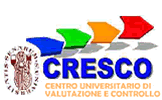Faculty of Sociology of the University of Rome 'La Sapienza'
Roberto BATTISTON
Luciano BENADUSI - Dean of the Faculty of Sociology, University of ‘La Sapienza’, Rome
Carmelo MAZZA - Università di Roma ‘La Sapienza’
Scholars in the economic and the sociological disciplines have recently paid attention to the reform of the university system. University reform has been viewed as a cornerstone of several processes: the establishment of EU, the structuration of the so called knowledge society, the globalization of knowledge production. The university reform has therefore been part of the reform agenda of single States to meet large societal expectations through appropriate public policies. So far, economic and sociological perspectives have largely relied upon macro social dynamics to describe the emergence of new practices and professions within the university systems. The emergence of new practices and professions has been the main object of analysis in the EIASM workshop held in May 2004 in Siena which hosted an insightful debate about the main themes of the reform of the university system in Europe. Building on the most significant insights of the EIASM workshop in Siena, we noted an underpinning theme, among others, in the debate on the university reform process; the relationship between the performance of the university system and the overall economic performance (competitiveness) of a country and other transnational institutions (e.g. the European Union). Recently, economic downturns and the competitive challenge of new industrially developed countries (China, India, Brasil) have put the issue of knowledge and research on top of the political agenda. In a knowledge society where knowledge-intensive firms are seen as being able to compete with low-cost economic systems, investments on knowledge and cultural capital are considered to becoming more and more strategic. There is no doubt that universities are expected to be a key factor in sustaining the competitiveness of countries in the globalized economy. Investments in research and knowledge developed by the university system are considered as the key factors in boosting the economy of a country. Moving from this premise, some scholars and policy makers would aim at strengthening the link between the university system and firms investments to support the overall competitiveness of countries. Some others would instead argue that a tight link between the university system and firm investments is potentially disruptive of the concept itself of university and would seek for it alternative roles and functions. This conference aims to offer a venue for social sciences to analyze and debate this issue for very much is still to be said on the process of university reform and its relationship and impact (if any) on competitiveness. In a similar vein, we expect social sciences to have a say in the evolution of the university as institution in the light of the spreading rhetoric and discourses which wants the university to become functional to competitiveness and economic success in a knowledge production system which is currently undergoing complex transformations. The conference welcomes different perspectives/approaches on these central themes. Expected contributions may range from institutional economics to sociology of knowledge and institutional theory of organizations as well as political sociology and sociology of education. The workshop aims to set up a venue for the exchange of opinions among scholars, policy makers and independent observers and intends to facilitate the dialogue among theoretical frameworks, empirical evidence and ‘local’ experiences by adopting a format including academic paper presentations, panels of academics and experts and roundtables with policy makers. Through this dialogue the workshop intends to create the milieu for theory development and a reflection on managerial and governance practices which helps both academics and policy makers sharpen their hypotheses and opinions on the role of university in contemporary economies and societies.
Please click HERE to upload the workshop main programme. Please click HERE to upload the parallel sessions programme.
For Umberto PAOLUCCI's text, please click HERE |






